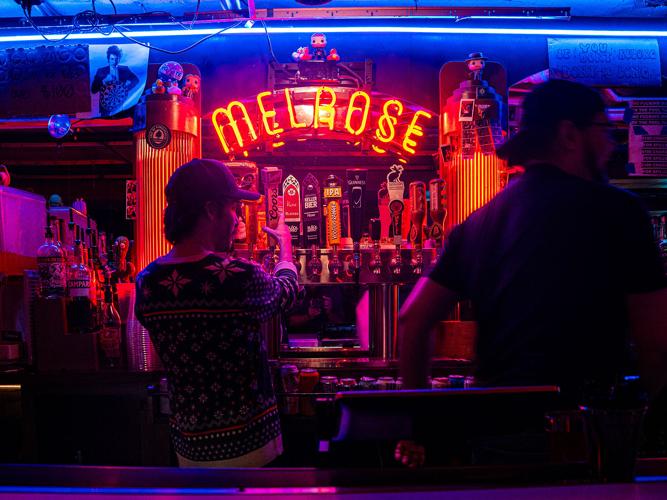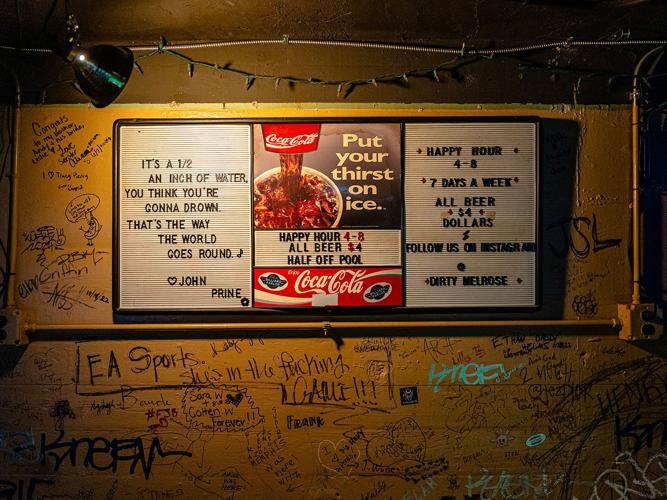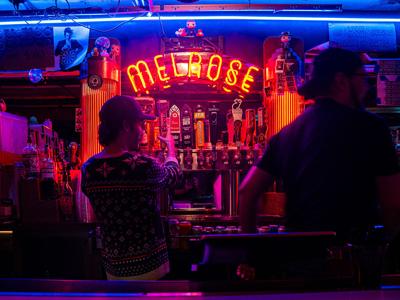This story is a partnership between the Nashville Banner and the Nashville Scene. The Nashville Banner is a nonprofit, nonpartisan news organization focused on civic news. Visit nashvillebanner.com for more information.
I don’t think you can actually smell the 2010 flood in Melrose Billiards, but sometimes I think I think I can.
When the front door closes behind you from Eighth Avenue, it doesn’t matter how hot or bright it might be outside — you have stepped into a place that’s dark, cool and just a little dank. The walls of the curved steps heading downstairs are scrawled with graffiti; some of it is pristine, and some is just drunken scratching, but it sets the mood for where you’re headed.
Once you get downstairs, Melrose Billiards is as simple as a dive can be, with a long bar for hanging out on one side and a few booths for more intimate conversations on the other. On the wall across the way is an old Coca-Cola sign with a quote from a 1978 John Prine song: “It’s 1/2 an inch of water and you think you’re gonna drown / That’s the way that the world goes ’round.” Given the amount of water that’s closed this place over the years — that’s a risk you take when you build an underground lair — the lyric could be about Melrose Billiards.
Prine used to play snooker with friends regularly down here before he died in 2020. It was one of the joys of an earlier version of Nashville where you could find someone like Prine or, more recently, Jack White — in a bar like Billiards, just living their life. No entourage, no Instagram hits, no influencers to be found. It’s been like that for 80 years, since it first opened in 1944.
Former Nashville Banner photographer Ed Rode took a fantastic portrait of Prine next to the tables 31 years ago. It’s included in a book of music industry portraits he’s got coming out later this month. At the photo shoot, Rode thought he could keep up with Prine because he’d been playing snooker since he was a kid.
“Cigarette in hand, he methodically cleaned my clock,” says Rode. “Lesson learned.”
Grayson Crouch has seen it all down here. When he came to Nashville in 2007, he shared a house within walking distance of Billiards. This was before the revitalized Berry Hill started trading auto shops for apartment complexes and old theaters for restaurants. He was a regular before he began working at Billiards more than a decade ago. These days he’s the manager. Crouch says they get a few tourists, but they blissfully avoid the bachelorette hordes who regularly invade some other places.
“Bachelorettes don’t like to shoot pool,” says Crouch with a chuckle.
From Fran’s to Betty’s, everyone in Nashville wants the same thing
Crouch is acutely aware that places like Billiards are dying off around Nashville, something he calls “the unstoppable change.” When the new ownership took over in 2016, there was a fear that they would ruin Billiards and chase the same tourist dollars many others have. But Joe Parkes and Austin Ray — the latter of whom also owns M.L.Rose across the street — were faithful to the place and only put in new air handlers and some infrastructure. That dank smell is mostly in my head.
“Not every place is sacred, but I feel like a lot of the places that we’ve lost in the last few years should have been,” says Crouch. “I wish that more places like this could have stuck around, like Rotier’s and Gold Rush. It is the culture of the city. And we’ve lost a lot of that.”
Most of these were cheap hangouts to eat and drink that stuck around long enough to see a revitalized city explode with new wealth and soaring real estate prices. The land beneath them became too valuable to be a dive. Rotier’s has been bulldozed completely, its West End home destined for something tall and gleaming.

Developer Tony Giarratana, who’s responsible for some of what the Banner’s Demetria Kalodimos called “the glassification of Nashville,” has been fighting the good fight on some of this, revitalizing Elliston Place Soda Shop and looking to bring back both Mosko’s and The Gold Rush on the old “Rock Block.”
“These beloved establishments were part of the urban fabric that made the Rock Block such a popular destination,” Giarratana tells the Banner. “While demolishing everything and starting over would be the easiest and most profitable solution, we believe making the extra effort to preserve/bring back as much of the old as possible … will bring Rock Block back to life and be worth the effort.”
But those victories are becoming increasingly rare. The Nashville that Crouch moved to 17 years ago was still affordable to people working in the service industry. Now his staff can’t afford to live close to the job like he did. Some even commute from out of the county.
Crouch says that “if I was 20 years old moving here now,” his mother’s prediction that he’d move home in a few months would have been true. “You can’t afford it. You know, maybe if I found this place and hung out here, I might stick around because these are the kinds of places I like. But if I moved here now, I wouldn’t spend 17 years here, I don’t think.”
That’s one reason why Billiards feels like a dark, dank miracle these days. A place like this shouldn’t last 80 years in a city actively chasing everything that’s new and shiny. Of all the things Nashville needs to grapple with — and it’s a long list — one is the number of haunts disappearing that are a quiet part of the city’s culture. Once gone, they can’t be replicated.
Walking back upstairs, I notice a cartoon recently drawn below the “Pool & Cold Beer” sign painted on the wall. It’s a self-portrait from a former contractor who would chair the Tennessee Arts Commission. “Walter Knestrick played pool there in 1949,” he wrote beside his likeness. “Had a visit in 2024!!”
Who knows if it will still be there in 80 more years. Let’s hope so.








